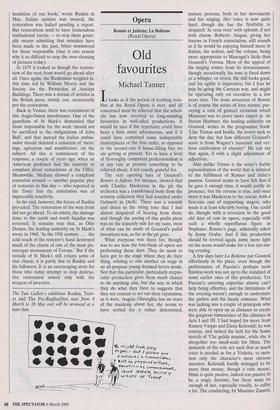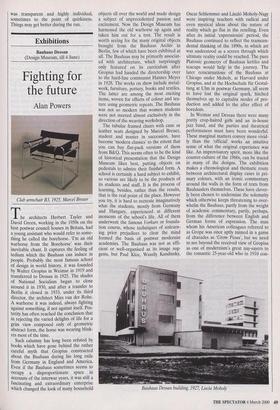Op e ra Romeo et Juliette; La Boheme (Royal Opera)
Old favourites
Michael Tanner
It looks as if the period of teething trou- bles at the Royal Opera is over, and all concerned must be relieved that the sched- ule has now reverted to long-standing favourites in well-oiled productions. It would be nice if the repertoire could have been a little more adventurous, and if it could have contained some indisputable masterpieces of the first order, as opposed to the second-rate if house-filling fare we are getting at present. Yet to have a level of thoroughly competent professionalism is at any rate at present something to be relieved about, if not exactly grateful for.
The very opening bars of Gounod's Romeo et Juliette, for instance, showed that with Charles Mackerras in the pit the orchestra was a transformed body from the scrawny collection they had sounded under Gelmetti in Otello. There was a warmth and sheen to the string tone that I had almost despaired of hearing from them, and though the pacing of this prolix piece was on the leisurely side for my taste, most of what can be made of Gounod's pallid inventions was, so far as the pit goes.
What everyone was there for, though, was to see how the love-birds of opera are performing these days. They do seem to have got to the stage where they do their thing, relating to one another on stage in an all-purpose young doomed lovers mode. Not that this particular, particularly crepus- cular production gives them much chance to do anything else, but the way in which they do what they have to suggests that they are content to act out their reputation, as it were. Angela Gheorghiu has no trace of the maidenly about her, she seems to have settled for a rather determined, mature persona, both in her movements and her singing. Her voice is now quite hard, though she has the flexibility to despatch `Je veux vivre' with aplomb, if not with charm. Roberto Alagna, giving her lessons in French enunciation, still sounds as if he would be enjoying himself more in Italian, the ardour, and the volume, being more appropriate to Mascagni's Sicily than Gounod's Verona. Most of the appeal of his singing comes from its strenuousness, though occasionally his tone is fined down to a whisper, or croon. He still looks good, and his agility is impressive; but I fear he may be going the Carreras way, and might be operating only on overdrive in a few years time. The main attraction of Romeo is of course the series of love scenes, pur- veying a vein of genteel eroticism which Massenet was to prove more expert at. As Steven Huebner, the leading authority on Gounod, writes in the programme book; `Like Tristan and Isolde, the lovers seek to deny the day, but how different Gounod's score is from Wagner's luxuriant and ver- bose celebration of eternity!' He can say that again, if with a slight adjustment of adjectives.
Also unlike Tristan is the score's feeble representation of the world that is inimical to the fulfilment of Romeo and Juliet's passion. Gounod seems to have felt that if he gave it enough time, it would justify its presence; but the reverse is true, and once more it was Mackerras to the rescue, with a first-rate cast of supporting singers, who made it at least tolerably boring. One could do, though, with a reversion to the good old days of cuts in opera, especially with such a wholly superfluous figure as Stephano, Romeo's page, admirably taken by Jenny Grahn. And if this production should be revived again, some more light on the scene would make for a less eye-tax- ing evening.
A few days later La Boheme put Gounod effortlessly in his place, even though the performance of Puccini's perhaps most flawless work was not up to the standard of some earlier ones of this production. Yet Puccini's unerring expertise almost can't help being effective, and the limitations of the evening weren't enough to undermine the pathos and the heady romance. What was lacking was a couple of principals who were able to open up at climaxes to create the gorgeous tumescence of the climaxes in Acts I and III. I had hoped for more from Ramon Vargas and Elena Kelessidi; he was routine, and lacked the heft for the home stretch of `Che gelida manina', while she is altogether too small-scale for Mimi. The demands of the role are such that as much voice is needed as for a Violetta, to men- tion only the character's most obvious ancestor. Kelessidi hardly managed to be more than mousy, though a cute mouse. Mimi is quite passive, indeed too passive to be a tragic heroine; but there must be enough of her, especially vocally, to suffer a lot. The conducting, by Massimo Zanetti, was transparent and highly individual, sometimes to the point of quirkiness. Things may get better during the run.



































































 Previous page
Previous page